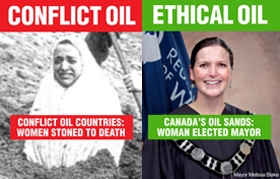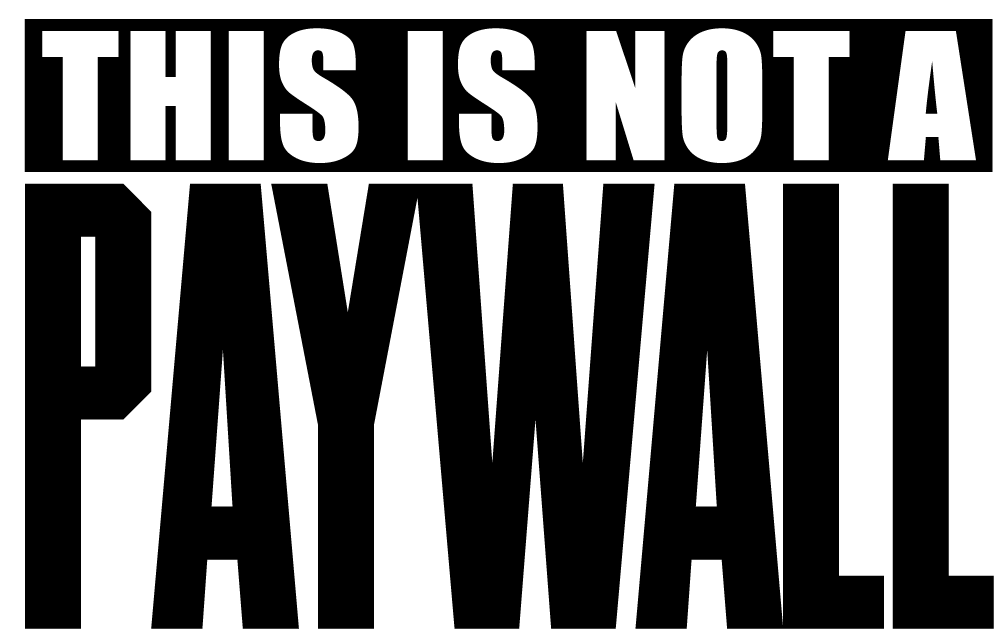EthicalOil.org’s new spokesperson, Kathryn Marshall, authored an insulting piece this week on the Huffington Post titled "Care About Women's Rights? Support Ethical Oil". Marshall’s piece is a response to the October 11 article by Maryam Adrangi at It’s Getting Hot In Here. Adrangi argues that the underlying motive of the "ethical oil" campaign is to deflect negative attention from the tar sands, not to actually engage in a conversation about women’s liberation.
“If women’s rights were of genuine concern to EthicalOil.org” writes Adrangi, “then there would be a conversation about the impacts that tar sands extraction has on women”.
You’ll notice that Marshall’s attempted rebuttal fails to actually address the substantive criticisms made in Adrangi’s piece – Marshall never mentions the impacts of Alberta’s tar sands development on women, but instead repeats the same arguments and general hand-waving that sparked Adrangi’s criticism of EthicalOil.org's conservative pundits in the first place.
Marshall’s promotion of tar sands oil is framed around a central argument that if we care about women’s rights then we must support tar sands expansion, and by extension the Keystone XL pipeline, because Canadian women fare far better than women in petrocracies, such as Saudi Arabia. But Marshall’s argument doesn’t hold up to scrutiny for three major reasons.
The first is that increasing tar sands output will not hurt the Saudi sheiks' coffers. TransCanada’s own research proves that the Keystone XL pipeline was never meant to decrease our reliance on foreign oil, just to keep Gulf Coast refineries at capacity. As global demand for oil keeps going up, a marginal shift in Canadian and US consumption will be offset by growing demand from other countries, keeping prices high and continuing to enrich the oppressive Saudi regime. Expanding the tar sands just buys Saudi Arabia a bit more time to profit before we are compelled to shift away from oil addiction towards a clean energy future – the real 'ethical' choice.
This leads to the second major flaw in Ethicaloil.org’s argument: it presents the reader with a false choice. Marshall’s bait-and-switch suggests that we must make a choice between “conflict oil” and “ethical oil”. On the contrary, you can simultaneously support women’s rights and oppose Alberta’s tar sands. The two aren’t mutually exclusive, to say the least. If we really want to hurt the regimes of oppressive petrocracies, then the wise choice is to end our addiction to fossil fuels and move rapidly towards a clean energy economy, setting a model that the rest of the world can follow. EthicalOil.org's entire line of reasoning is a diversionary tactic designed to obscure this hard reality. It's a red herring, and a dangerous one at that.
Third, Marshall’s emotional appeal tells readers that because women’s rights are worse in petrocracries, then we needn’t concern ourselves with what’s happening in Canada. In Canada, we have female mayors and premiers. We are a liberal democratic nation that respects human rights. I agree that the plight of women in many petrocracies is grave, but that does not mean that the plight of many women in Canada deserves less consideration from Canadians.
We can and should engage in critical discussions on women’s rights in Canada. And tar sands expansion forces us to explore some of these issues head-on.
In Alberta’s tar sands region in particular, rates of sexual violence towards women have increased and women working in the industry have reported sexual harassment and gender discrimination. With expansion of the tar sands industry, instances of domestic violence in Fort McMurray have spiralled upwards, and few women have safe places to go, forcing many to return home to their abusers.
Instead of pretending that expanding the tar sands will somehow help women in Saudi Arabia, let's talk about how we can help Canadian women impacted right here at home by tar sands expansion.
Marshall boldly demands to know where Canadian women’s groups have been in speaking out against Saudi women’s oppression. Did she ever think to ask these groups? I did. For one, Jan Slakov, the National Secretary for Canadian Voices of Women for Peace, the organization that Marshall attacks in her piece, told me,
"The Canadian Voice of Women for Peace has worked to support women's rights and well-being, not just in Canada, but around the world. Groups have raised funds to support programs in countires where women face systematic human rights abuses. We also work at the international level to support women's rights through the UN."
As a Women’s Studies graduate, Marshall should know that Canadian women's rights groups are engaged in this fight directly. Instead, Marshall, while claiming to be an advocate of women’s rights, erases the history of the women’s rights movement in Canada and its work in global solidarity with women living under oppressive regimes. I can’t speak for women’s groups, but I think it’s telling that we haven’t heard any credible organizations supporting EthicalOil.org’s message. I suspect they see right through EthicalOil.org’s insincere issue hijacking.
"We recognize that extreme weather events associated with climate change disproportionately affect women, especially in the world's poorest countries. This is one of the many reasons why we feel it is essential that Canada do its part to cut GHG emissions to the earth's atmosphere."
Marshall's attempts to disparage Canadian women's rights groups proves Maryam Adrangi’s point: “When we get attention, they get defensive and they look silly.”
And what else frankly looks silly is Kathryn Marshall's connections to the oil lobby. Marshall learned her pro-oil talking points as an intern with the fossil fuel-funded Fraser Institute. Their internship program is funded in part by oil and gas money, including Gwyn Morgan of Encana and R.J. Pirie of Sabre Energy. Until July 2009, Marshall worked as Fraser's Development Manager and raised over $125,000 to promote pro-oil, free market thinking.
Given this, it's clear whose interests she's chiefly representing, and it isn't women's rights. It's the oil industry and its status quo profiteering without regard to the impacts of pollution on our planet, our familes and especially our women.
Ethicaloil.org, if you really care about women’s rights, how about engaging in a real discussion of the impacts of the tar sands on First Nations communities and women? Prove you’re engaged in the advancement of women’s rights by joining the conversation about how to actually challenge oppressive Saudi sheiks –through a transition to a clean energy future.


